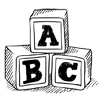Introduction: Wooden blocks are more than just playthings; they are educational powerhouses that seamlessly blend learning and fun. These versatile toys have proven to be invaluable tools in early childhood education, supporting various aspects of cognitive and physical development. In this blog, we’ll delve into the educational power of wooden blocks and how they enrich learning experiences for children.
- Language Development: When playing with wooden blocks, children engage in conversation, describing their creations and exchanging ideas, which fosters language development and communication skills.
- Science and Engineering Concepts: As children experiment with balance, stability, and cause and effect when building with wooden blocks, they unconsciously absorb scientific and engineering principles.
- Problem-Solving Skills: Wooden blocks offer endless possibilities and challenges, encouraging children to think critically and solve problems as they encounter construction hurdles.
- Early Math Skills: Through stacking and counting blocks, children gain an intuitive understanding of basic math concepts, like quantity, size, and shape.
- Emotional Regulation: Building with wooden blocks can be a calming and therapeutic activity that helps children manage their emotions and practice patience and persistence.
Conclusion: Wooden blocks have proven to be powerful tools in early childhood education, facilitating language development, introducing science and engineering concepts, promoting problem-solving skills, fostering early math skills, and aiding emotional regulation. By integrating learning and fun, wooden blocks create a stimulating and supportive learning environment for children, nurturing their curiosity and passion for exploration while preparing them for future academic and life challenges.








